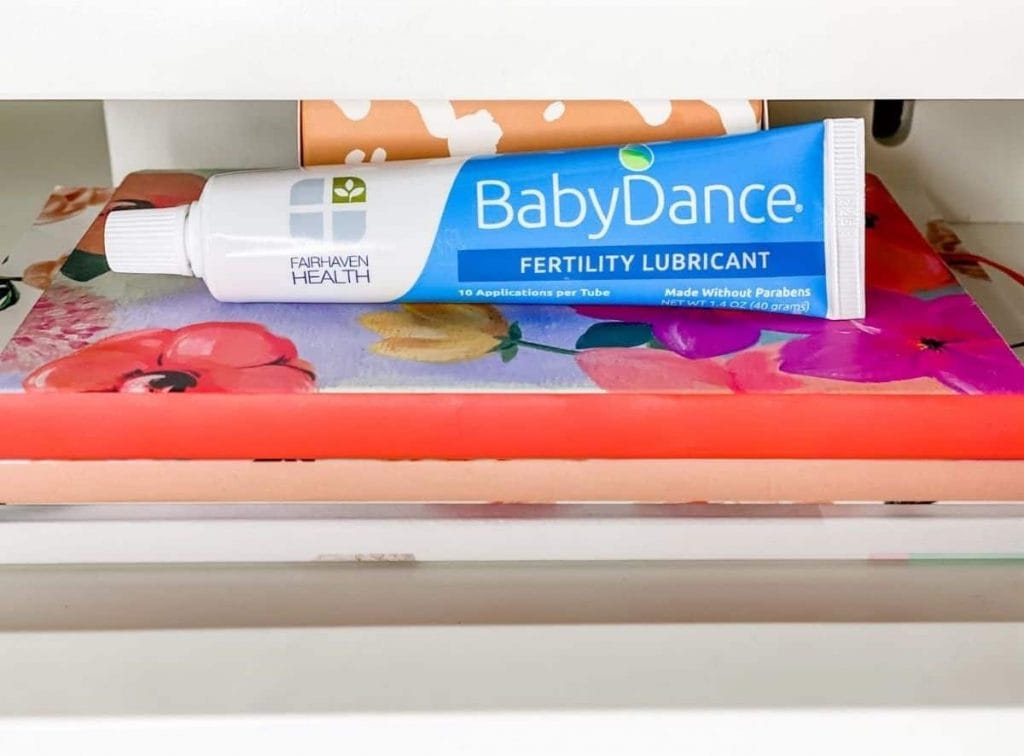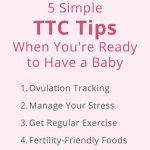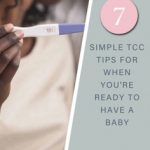So you’re trying to conceive quickly, and the internet is abuzz with so many crazy ideas and information about what to do that you don’t even know who to trust. No worries, friend. You’ve found the right place.
We’ve lived it, researched it, and supported others through their trying to conceive (TTC) journeys, and we’re here to share the TTC tips you need to make this process as stress-free as possible.

This site contains affiliate links, meaning that we earn a small commission for purchases made through our site. We only recommend products we personally use, love, or have thoroughly vetted.
- Why Trust Us?
- TTC Quick Tips
- Tips to Conceive That We Personally Use
- 1. Get to Know Your Body With Ovulation Tracking
- 2. Don’t Stress Over Sex, But Do Time It
- 3. Have Sex Every (Other) Day Around the Time of Ovulation
- 4. Manage Your Stress
- 5. Move Your Body
- 6. Eat Healthily
- 7. Take the best prenatal vitamin for your body
- 8. Use A Fertility-Friendly Lube
- 9. Learn How to Help Implantation
- 10. Seek Help If Needed
- How Long Does it Take to Get Pregnant?
- TTC Tips FAQs
- Other Pregnancy Articles
- Trying to Conceive Articles
- More Postpartum Articles
Why Trust Us?
This article was written by Katy Huie Harrison, PhD, a fertility advocate who learned way too much about the TTC journey in the years she spent trying to conceive & carry a healthy pregnancy. This article is fact checked by Sarah Cocke, who has 15 years in the research-based fertility industry, plus plenty of personal experience TTC.
TTC Quick Tips
We’ll break it down in more detail below, but if you’re looking for the most important quick and easy tips, we recommend that you start here:
- Learn About Your Body: There are tons of ways to track ovulation, and we’ve broken them down for you in easy-to-use detail. Learning about your cycle will be truly game changing.
- Prioritize Your Health: Rest, hydrate, exercise, and take your favorite prenatal vitamins.
- Maintain Good Vaginal Health: This could mean taking probiotics for vaginal health, using a fertility-friendly lubricant to help maintain the proper pH balance, and avoiding activities like douching that can upset vaginal health.
*Note: This is a sponsored article on behalf of Fairhaven Health, meaning I have been compensated for this article. All the content included is my honest opinion, and this is my true story. I only work with brands and recommend products I personally use and love.
Tips to Conceive That We Personally Use
With so much advice out there, we’re going to stick to the ones that meet the following criteria:
- Evidence-Based
- Easy to Implement
- Not Going to Add Stress to Your Play
So let’s dive into the tips that we’ve personally used when TTC.
1. Get to Know Your Body With Ovulation Tracking
Knowing when you ovulate is like having a secret key to pregnancy. It’s not rocket science, but it makes all the difference, and honestly, it’s super empowering.
If you’re aware of your cycle, you can plan to have sex or inseminate regularly in the days leading up to ovulation.
There are so many different ways to do this, so check out our article on how to track ovulation to choose the best method for your body, interests, and budget.
2. Don’t Stress Over Sex, But Do Time It
It’s easy to turn sex into a chore when you’re trying to conceive, so if that’s your pathway to conception, try not to make it too hard on yourself. As you learn more about your cycle, you’ll definitely want to have sex more in the days leading up to ovulation.
Try not to let that stop you from being intimate at other times of the month. Saving up intercourse for ovulation can have a strong emotional impact on both partners, and it’s just not worth it. Also, you may ovulate at a different time than you think, so sex for fun is still important.
Of course, if you’re inseminating, don’t waste that precious sperm until it’s time!
3. Have Sex Every (Other) Day Around the Time of Ovulation
Quick caveat: this is only accurate if you know your partner has good sperm count and quality. Otherwise, too much sex around ovulation could be counterproductive.
But for hetero couples where the male partner has good sperm health (good count, motility, and morphology), having sex regularly during your ovulation window is key.
According to the Mayo Clinic, “The highest pregnancy rates occur in couples who have sex every day or every other day.”
4. Manage Your Stress
We all know “just relax” is the last thing you want to hear when you’re trying to conceive. But managing stress does play a role. It’s not about bubble baths and candles (unless that’s your thing); it’s about finding what keeps you grounded. Maybe it’s a walk, a good chat with a friend, or just some quiet time.
A bit of science: According to researchers, when the female body is in a stressed or anxious state, it produces increased levels of the alpha-amylase enzyme. Studies show that women with too much of this enzyme can have a 12% higher risk of fertility struggles.
Here are a few ways to help relax just a bit each day:
- Journaling
- Meditating (we love apps for this)
- Yoga
- Taking a walk
- Reading
- “Me time”
Whether it helps you conceive or not, caring for your mental state is a crucial part of being the best version of yourself you can be.
5. Move Your Body
Regular exercise is great for stress relief and keeping your body in baby-making shape. It’s not about running marathons; it’s about staying active in a way that feels good to you.
Developing a regular exercise routine can actually go hand-in-hand with stress management and weight management, both of which can help in your conception journey. Plus it helps regulate hormones, which we definitely care about when TTC (and all the time, right?)
6. Eat Healthily
While there may not be a magical pill or diet that can guarantee a pregnancy, many foods have proven themselves beneficial to fertility.
Eating better, in general, is an excellent place to start in terms of fertility boosting foods. Here’s a simple breakdown, and you’ll notice it looks much like any other list of how to eat nourishing foods:
- Healthy fats, e.g., eggs, nuts, and avocados
- Full-fat dairy products, e.g., yogurt, ice cream, cheese, and milk
- Asparagus
- Pineapple
- Lentils and black beans
- Spinach and kale
Each of these items comes with a variety of different beneficial factors, but many are loaded with fertility-rich nutrients like Omega-3 fats, vitamin A, protein, folate, and choline.
They’ll work to improve hormonal imbalances and provide better embryo health upon conception.
7. Take the best prenatal vitamin for your body
So here’s a cool and little-known fact: our bodies all absorb nutrients and vitamins differently, depending on our genetics, and we can actually learn about our genes in a way that’ll let us choose the best prenatal vitamin for our specific bodies.
The Genate Test is changing the game for TTC & expecting families for exactly this reason. Turns out that of the 97% of expecting moms supplementing with prenatal vitamins, more than 70% of women face genetic nutritional deficiencies during pregnancy.

That’s why we adore this simple cheek swab that’s revolutionizing choose the best prenatal supplementation regimen for moms.
8. Use A Fertility-Friendly Lube
You heard me right. There’s special lubricant that you can use when trying to conceive, and yes, it can really make a difference. Many lubricants, as well as saliva, can throw off that healthy pH balance, leading to a less sperm-friendly environment during sex.
That’s why we love BabyDance Fertility Lubricant, which features a pH and consistency similar to egg white cervical mucus that’s meant to support sperms on its journey through your reproductive tract.

In addition to being isotonic and pH matched to mimic your own cervical mucus, BabyDance is healthy for your reproductive body in more ways than helping sperm motility. It’s made in the US using the most up-to-date science, is fragrance-free, and uses no parabens (a common preservative that can mimic the hormone estrogen and potentially impact fertility.)

9. Learn How to Help Implantation
Skip the folklore; here are some ways to help implantation that have scientific backing:
- Eat lots of leafy greens
- Reduce alcohol consumption
- Take generally good care of your health
10. Seek Help If Needed
If things aren’t happening, don’t hesitate to see a doctor. There’s no shame in asking for help, whether it’s been a few months or over a year. You may want to contact your doctor sooner if you also experience:
- Inconsistent or irregular periods
- Prolonged menstrual bleeding
- Heavy cramping or bleeding during period
- Long cycles (more than ~35 days between periods)
- Painful ovulation
- Pain during intercourse
- Inability to lose or gain weight
Combinations of these symptoms may warrant testing for issues like polycystic ovary syndrome (PCOS), endometriosis, adenomyosis, uterine fibroids, thyroid problems, and more. Also be sure to talk to your doctor if you have a history of blood clots.
For US families, if you have insurance but your company won’t pay, ask your doctor if there is a way to code tests so that they aren’t fertility-related. There are often workarounds to get coverage.
If your doctor isn’t willing to test but you feel testing is needed, we recommend Modern Fertility.
If you’ve had fertility testing done at your doctor’s office, you won’t learn anything new from Modern Fertility. But if you want an overview of your fertility and a reason to push your doctor if there’s a problem, this at-home test can give you some of the answers you seek.
Modern Fertility’s testing kit tests the hormone levels that matter most for fertility. Follow the instructions and mail off for results that are interpreted by medical professionals for easier comprehension. You’ll get insider knowledge into the hormones that give us insight into your ovarian reserve (AMH & FSH), thyroid function (TSH & fT4), support ovulation (prolactin & LH), and more.
How Long Does it Take to Get Pregnant?
For most hopeful healthy parents, conceiving takes about a year of regular, unprotected sex. But this can vary greatly depending on several factors like:
- Age
- Overall health
- Lifestyle choices
- Stress levels
If you find yourself at the one year mark of trying to conceive (or 6 months if you’re over 35), definitely contact your doctor. You can also use a test like Modern Fertility if you’re worried but your doctor won’t see you yet. The results may help you advocate for better care faster!
What are the Chances of Getting Pregnant?
For healthy, fertile couples who have regular, unprotected sex, the changes of conceiving each month are approximately 20%. This means that if you throw caution to the wind and let nature take its course, you have a decent shot of a positive pregnancy test within one year.
Within the one year average, the break down looks like this:
- Within the first three months of trying, about 60% of hopeful parents will conceive.
- By the six-month mark, that number rises to 80%.
- 85% of hopeful parents conceive within the one year mark.
- If a year goes by without any success, it’s a good idea to consult with your OB-GYN and/or reproductive endocrinologist for a basic fertility screening.
TTC Tips FAQs
There are many things you can do to improve your chances of conceiving, but the most important is learning about your cycle, knowing when you ovulate, and having sex during your ovulation window.
Sperm can remain alive in the female body for up to 5 days, but the closer you are to ovulation day when you have sex, the better your chances of conception that month. Eggs do not live long, so it’s important to inseminate before ovulation.
While nothing is guaranteed, you can best improve your chances by learning when you ovulate, having sex regularly in the 5 days leading up to ovulation, and using fertility lubricant to help foster sperm motility.
Most people don’t need to make major lifestyle changes when TTC, but there are some small changes that can help improve fertility naturally. Eating a healthy diet and cutting down on caffeine and alcohol can be useful. And if you’re a smoker, now is the time to stop.
The best time to get pregnant is the three days leading up to and including ovulation, which happens about 12-14 days before your next period starts. There are many easy ways to track and predict ovulation, including period trackers and tracking your basal body temperature.
After giving birth, you can get pregnant again in as little as three weeks even if you’re breastfeeding and your period hasn’t started again. Most experts suggest waiting a year to 18 months before getting pregnant again.
Other Pregnancy Articles
- Unusual early pregnancy symptoms
- Hospital bag checklist printable
- Birthing checklist (how to write a birth plan)
- Getting ready for a baby checklist
- Baby registry must haves
- How to prepare for labor induction
Trying to Conceive Articles
- TWW (2 week wait) (surviving the two week wait when TTC)
- Pre-pregnancy planning
- How to encourage implantation of an embryo
- How to decide when to have a baby
- TTC after miscarriage
- Acupuncture for fertility
- One week pregnancy symptoms










